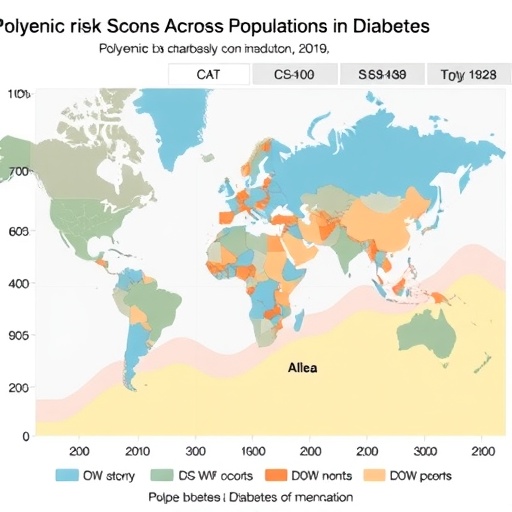In a groundbreaking study published recently in Nature Communications, researchers have unveiled compelling evidence about the complex and context-dependent nature of polygenic risk scores (PRS) for type 2 diabetes (T2D) across diverse populations. This discovery challenges the traditional notion that genetic risk scores are universally applicable and underscores the urgent need to tailor genetic prediction models to different ethnic and population groups to enhance precision medicine.
Type 2 diabetes, a metabolic disorder characterized by insulin resistance and impaired glucose regulation, affects hundreds of millions worldwide. Genetic studies have long sought to identify individuals predisposed to T2D using polygenic risk scores, which aggregate the effects of numerous genetic variants across the genome. However, the predictive accuracy of these scores has been inconsistent when applied across global populations, raising critical questions about their clinical utility in diverse settings.
The team, led by Guo, Cai, and Kim, embarked on an extensive analysis involving multiple population cohorts to dissect how polygenic risk scores perform in different genetic and environmental contexts. Their research draws from large-scale genomic datasets that capture the genetic variation in populations of European, East Asian, South Asian, and African ancestries, providing a comprehensive framework that mirrors real-world diversity.
One of the most striking findings is the pronounced variability in how the PRS predicts T2D risk depending on the population context. While PRS models derived predominantly from European datasets demonstrated reasonable predictive power within similar populations, their performance diminished sharply when applied to non-European groups. This discovery not only highlights a critical limitation but also emphasizes the potential for health disparities in the era of genomics-informed medicine.
Digging deeper, the study reveals that this variability arises from several factors, including differing allele frequencies, linkage disequilibrium patterns, and gene-environment interactions across populations. Genetic variants that confer risk in one group may be rare or have different biological implications in another, resulting in a context-dependent risk profile that defies a one-size-fits-all approach.
Importantly, the researchers showcased that integrating population-specific data into the PRS algorithms substantially improved predictive accuracy. By recalibrating risk scores with ancestry-specific genetic information, the models accounted for distinct genetic architectures and environmental exposures, thereby tailoring risk assessments to the unique genomic landscape of each population.
The implications of these findings extend far beyond academic inquiry; they bear directly on public health and clinical practice. Without context-sensitive PRS calibration, populations historically underrepresented in genomic research—particularly individuals of African and South Asian descent—may receive misleading risk information, exacerbating existing health inequities.
Moreover, the study highlights the significance of integrating environmental and lifestyle factors alongside genetic data to refine risk prediction further. Given that T2D is influenced by a complex interplay of genes and environment, future advances in polygenic risk scoring must adopt a multi-dimensional approach, incorporating diet, physical activity, socioeconomic status, and other non-genetic contributors.
This research also prompts a reconsideration of the ethical frameworks surrounding genetic risk prediction. Transparent communication about the limitations of PRS and the contextual nuances influencing their reliability is paramount to avoid misuse and misinterpretation in both clinical and public domains.
In addition to immediate clinical ramifications, the study sets a precedent for future genomic research initiatives aiming to build equitable and inclusive genetic databases. This work calls for a concerted global effort to diversify genomic repositories and invest in population-specific studies, which will ultimately democratize access to the benefits of precision medicine.
The methodology employed by Guo and colleagues involved advanced statistical modeling and cross-validation techniques to robustly assess PRS performance across diverse genomic datasets. Their rigorous analytical approach ensured that observed discrepancies were not artifacts but genuine reflections of population-specific genetic structures.
Notably, the research team proposed a framework for constructing adaptive polygenic risk scores that dynamically integrate multi-ancestry data, representing a forward-looking strategy to overcome current limitations. Such adaptive models could revolutionize genetic risk prediction by continuously learning from expanding genomic datasets worldwide.
The publication also addresses challenges related to computational resource demands and data-sharing ethics, emphasizing the need for collaborative infrastructures and transparent governance to facilitate responsible genomic research spanning diverse populations.
Furthermore, the study contributes to a growing body of literature that questions the generalizability of genetic findings derived from predominantly European cohorts, stressing the scientific imperative to rectify these biases for a truly global impact.
In summary, this landmark investigation into T2D polygenic risk scores uncovers the profound influence of population context on genetic risk prediction. It advances our understanding of the nuanced interplay between genetics and ethnicity, advocating for personalized genomic tools that respect and reflect human diversity. As precision medicine continues to evolve, these insights will be instrumental in shaping strategies that are as inclusive as they are innovative.
The study by Guo, Cai, Kim, and colleagues marks a pivotal step towards the realization of equitable precision health, setting the stage for future endeavors that harness the power of genetics while honoring the complexity of human populations.
Subject of Research: Polygenic risk scores for type 2 diabetes and their variability across different populations.
Article Title: Polygenic risk score for type 2 diabetes shows context-dependent effects across populations.
Article References:
Guo, B., Cai, Y., Kim, D. et al. Polygenic risk score for type 2 diabetes shows context-dependent effects across populations. Nat Commun 16, 8632 (2025). https://doi.org/10.1038/s41467-025-63546-4
Image Credits: AI Generated




